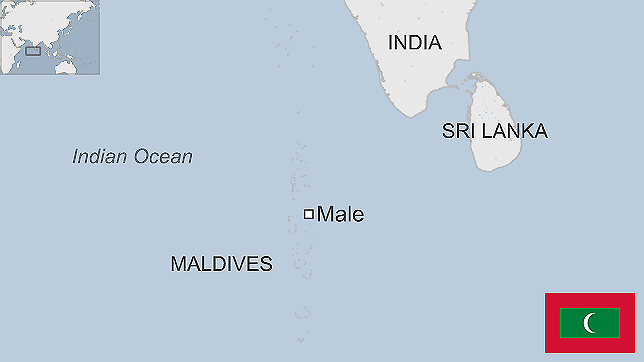Why did the Maldives release its most famous prisoner?
- Published
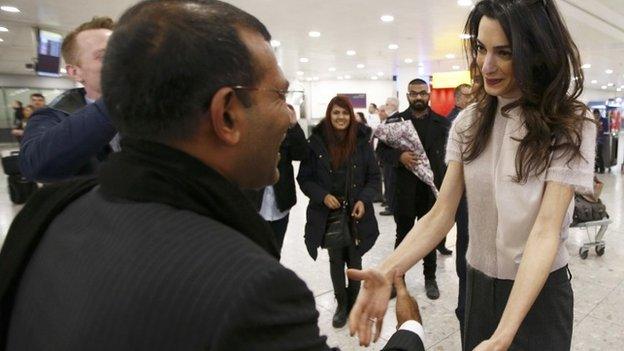
Human Rights Lawyer Amal Clooney is part of the legal team fighting for Mohamed Nasheed's release
He went from prison to president, and back again. Now former Maldives leader Mohamed Nasheed is in the UK, following his release for 30 days to receive medical treatment. But will he ever return home?
When I first met Mohamed Nasheed eight years ago, his story was already remarkable.
He had gone from being a scraggly-haired nuisance of an activist in a seemingly untouchable dictatorship, to then President Maumoon Abdul Gayoom's biggest rival - and soon-to-be successor.
Later that year, watching him being sworn in as the country's first democratically-elected leader, ending three decades under one man - I underestimated how events would bring the country into the headlines again and again, and how this man would be, as he often had, right at the heart of them.
In the years following he would find international fame for holding a cabinet meeting underwater, trigger opposition protests following the arrest of a judge, be forced from power in what he called a coup, charged with terrorism and jailed. And that's not to mention, notably as it now seems, secure a vital ally in the form of human rights lawyer Amal Clooney.
Now he is galvanising influential friends in the hope that he does not have to return to where he was just over a week ago: solitary confinement on an island jail. On Saturday, he began by meeting UK Prime Minister David Cameron, who in 2011 famously called Mr Nasheed his "new best friend".
"From Unit 10 to No 10," his supporters declared on social media.
And on Monday, he appeared in front of a room full of British journalists, flanked by his lawyers, to make his case. A little older, a little more tired perhaps, but ultimately the same well-humoured character, throwing out the odd joke to the crowd.
The government, in a press statement, denounced Mr Nasheed's publicity attempts, saying his trip had turned into "media leave, not medical leave".
Their PR firm, BTP Advisors, noted that Mr Nasheed's question-and-answer part of the press conference was not on camera, thus apparently proving he did not practice what he preached.
Mohamed Nasheed tells the BBC he would like sanctions to be put on some Maldivian officials
Shift towards China
So why did the Maldivian government allow their most highest profile prisoner out of his cell, to parade his case to governments and media, in the first place?
While the conviction last March of Mr Nasheed triggered international condemnation fairly quickly, President Abdulla Yameen stood his ground.
But pressure has been building.
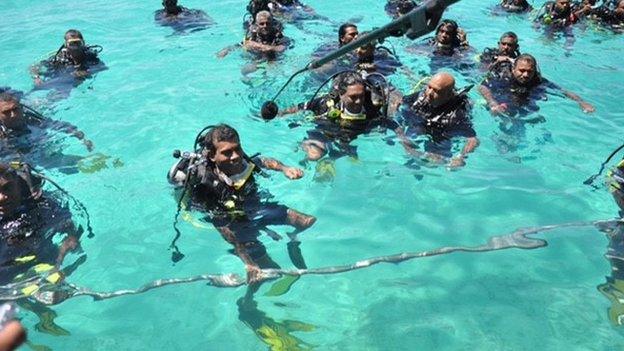
In 2009, Mr Nasheed held an underwater cabinet meeting
For the West, the apparent reversal of democratic gains, the growth of radicalisation, as well as a shift towards China, made the political situation of the Indian Ocean archipelago harder to brush off.
A ruling by the United Nations in October declaring that Mr Nasheed was "arbitrarily" detained and should be released helped clarify the situation for those not across the peculiarities of the case.
Then, after lobbying by Mr Nasheed's legal team, the idea of targeted sanctions began to gain traction.
Mr Yameen's intransigence may have started to waver when he considered the possibility that he or his closest allies may not be able to travel freely to Western countries, or that his assets abroad could be at risk.
Then there were visits by ministers from Sri Lanka, India and the UK, and some presumably strong words from the US. Mr Nasheed had not even left Maldives when he received a phone-call from US Secretary of State John Kerry, according to Mr Nasheed's lawyer Jared Genser.
In other words, it's doubtful the decision was made on "humanitarian" grounds, as President Yameen declared at a rally on Thursday. , external
Rock response
So what now?
Mr Nasheed has been permitted to 30 days of freedom, but is evading the question of any return.
In the press conference he addressed the issue with humour.
"The question you all want to ask is: 'Will I go back?'" said Mr Nasheed. "This has been more eloquently answered by the Clash: 'Should I stay or should I go?'"
Later, he told the BBC: "There is always this question of what's best for me and for the country. Would it serve any good if I remain languishing in a jail in the Maldives? Or would it be better or best for people who are advocating for democracy and human rights in the Maldives if I'm outside?
It is hard to imagine why he would want to go back only to serve 12 years in prison.
His older brother Ibrahim signed a release form - but not the one requiring him to be criminally liable. In any case, Ibrahim is reported to have managed to leave the country at the same time.
Mr Nasheed is entitled to six months' in the UK as a tourist, which he could renew. He could also apply for political asylum here - as he has done before, in 2005, shortly after forming his Maldivian Democratic Party (MDP).
That asylum (which he relinquished) aided his battle against Mr Gayoom, and he may well hope his British ties can once again help him against his old enemy's half-brother, President Yameen.
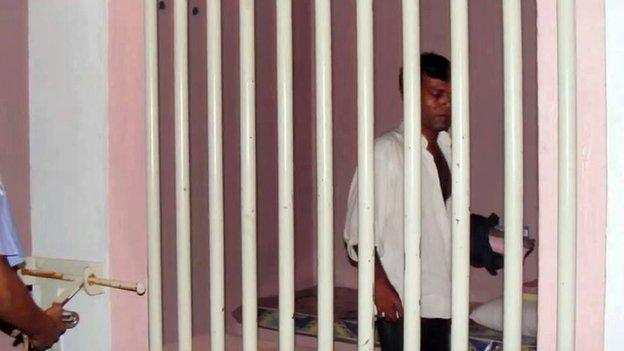
Mohamed Nasheed was jailed repeatedly under the autocratic government of Maumoon Abdul Gayoom
For its part, the Maldives government appears not to expect him back either. In a widely shared BBC interview, Foreign Minister Dunya Maumoon appeared unable to answer the question head on.
In the longer term, however, I cannot imagine Mr Nasheed not returning to continue his political fight. He was jailed countless times as a dissident in his younger days, but was never deterred.
Both he and his lawyers say this is not about one man, but about human rights more broadly, and says sanctions must be placed on the country until there are moves to address those issues.
It's true that, if Mr Nasheed's conviction is overturned and he is able to compete in elections, and return to power, then his troubles will be far from over.
The problems in the Maldives stem from a long period of dictatorship and corruption, and are hard to undo.
Enforcing the rule of law is near impossible in a country where the judiciary is, for the most part, corrupt and unqualified.
Prior to the 2008 constitution, roughly 80% of the judiciary possessed no more than a six-month certification course on sentencing, according to the International Commission of Jurists (ICJ). And one in four judges have a criminal record, a 2012 US state department report says.
In this kind of environment, it's not difficult to see why democracy was always going to be a struggle.
But it's one that, in the future, Mr Nasheed insists he wants to be a part of.
- Published21 January 2016
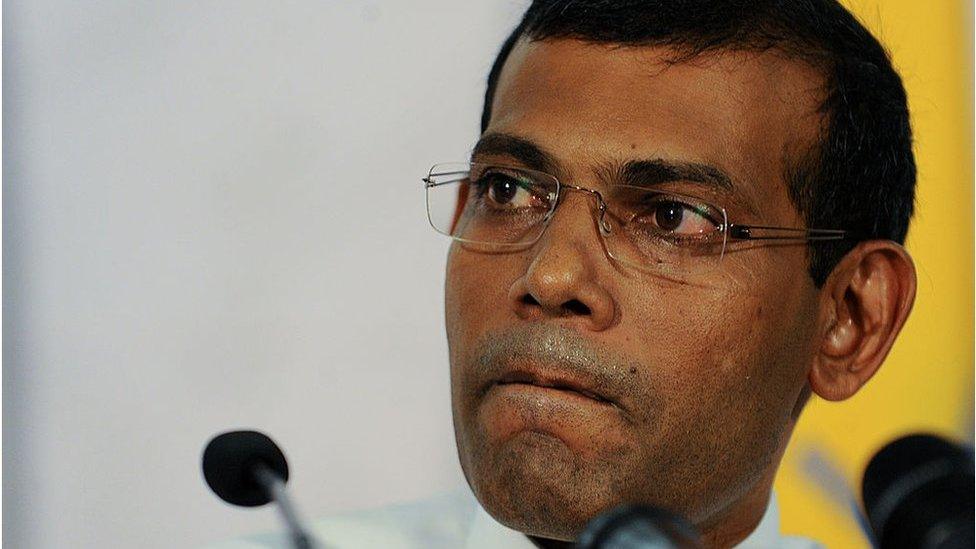
- Published10 March
